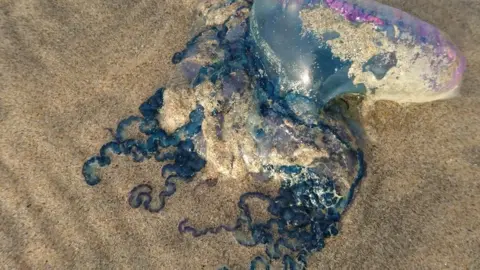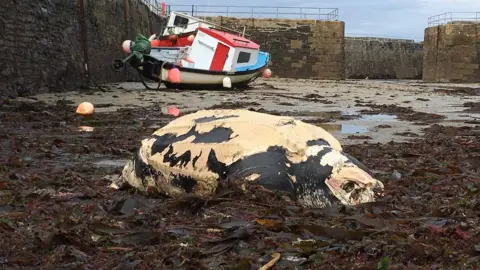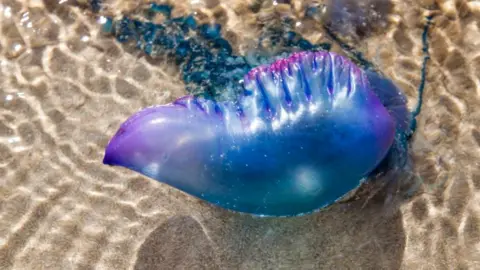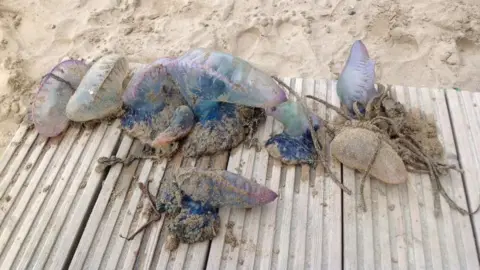Man-of-war spotted along coast in Cornwall and Wales
 BBC
BBCLarge numbers of potentially fatal Portuguese man-of-war have washed up on a Cornish beach, prompting its closure.
RNLI lifeguards erected do not swim red flags at Perranporth beach earlier because of the "unusually large number" of the creatures.
The jellyfish-like organisms, which have long purple tentacles, have also been seen in Wales this month, says the Marine Conservation Society (MCS).
With mild sea temperatures of 16C there were fears of swimmers being stung.
The RNLI said it placed red flags at Perranporth beach between 10:00 and 13:30 BST to signal that the water was out of bounds, while lifeguards took advice on the level of danger to beachgoers.
Man-of-war were spotted at Newgale, Pembrokeshire, on 8 September and the next day on beaches near the holiday destination of Newquay.
 Rachel Wyatt
Rachel WyattThey have also been seen at Porthmelon Beach on the Isles of Scilly and on the Cornish beaches of Portheras Cove and Summerleaze, Widemouth, Perranporth, Hayle, Holywell Bay and Praa Sands.
Six were also reported at Gwithian.
Dr Peter Richardson from the MCS said a man-of-war's tentacles, which are usually about 10m (30ft) long, "deliver an agonising and potentially lethal sting".
"They are very pretty and look like partially deflated balloons with ribbons but picking one up could be very nasty," he said.
The man-of-war retain their sting when they are wet, even if they look dead, he warned.
He advised anyone who was stung to get the tentacles away from the body as soon as possible.

What is a Portuguese man-of-war?
 Joanna Clegg
Joanna Clegg- The (Physalia physalis) is not a jellyfish, but a floating colony of organisms dependent on one another for survival
- Its gas-filled bladder (sometimes known as the sail), enables it to float on the ocean surface and drift with the current
- Its sting - delivered from tentacles which can reach up to 50m below the surface - is extremely painful for humans and can be fatal in rare circumstances
- Hundreds of swimmers are stung every year, especially when huge numbers appear in coastal waters

Leatherback turtles have also been washed up, Dr Richardson said.
A leatherback turtle was found at Portreath on 9 September and another one has been reported in Pembrokeshire.
The NHS recommends using tweezers or a clean stick, and gloves if possible, to remove man-of-war tentacles.
If symptoms become more severe, or a sensitive part of the body has been stung, you should seek medical help.
The MCS is asking people to report any sightings which could rise as man-of-war are driven across the Atlantic by recent storms.
 RNLI
RNLI